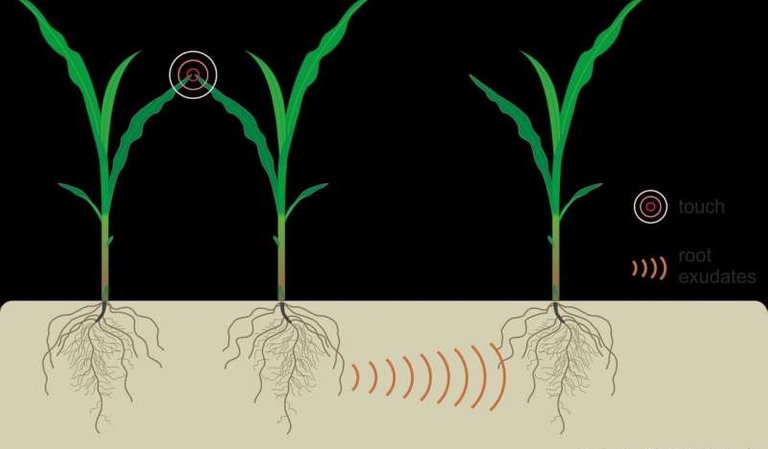Plants talk under the ground.
Generally speaking, the fact that plants can communicate with each other is far from new. For example, several years ago biologists from the University of California in Davis discovered that when wormwood starts to be eaten by someone, it releases the volatile substances that its neighbors catch and responds by synthesizing certain substances that make them less tasty. What is curious, the signal will be understood only by a close relative - if the neighbor-wormwood was genetically very different from the one who was in trouble, the distress signal passed him. And relatively recently we wrote about how plants warn each other about pests with the help of a parasitic dodder, which serves as something like telephone wires.

Feeling a touch, corn gives out its roots some substances that can feel other plants in the neighborhood. Illustration: Elhakeem et al. PLoS ONE.
But researchers from the University of Wageningen and the Swedish Agricultural University were interested in another: plants have in fact an aboveground part - leaves, stems, flowers, and underground - the root system. Can signals from the ground part affect the underground? And can plants respond to more innocuous touches? To find out, the corn plant was touched and stroked by the leaves - as if another plant was growing close to it, and collected all the substances that the disturbed plant isolated through its roots. Then these discharges were added to the ground to another corn plant, which no one stroked or jerked. Despite the complete peace, the second corn reacted to the root extracts first: the main root of the second tried to evade chemical signals (that is, tried to grow in the opposite direction), and in general new roots appeared slower and the whole root system turned out to be less than if corn such did not process. However, moreover, the plant gave more leaves and generally invested more resources in the aerial part. That is, it clearly somehow reacted to other people's feelings and tried to somehow optimize its growth with regard to its neighbors.
very funny post... is there radiation work between them... or the freequency of sound go throughly under soil... clay part or sandy clay part sound go through on his velocity
It's always interesting to see how many ways of communications exist in nature